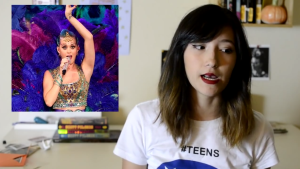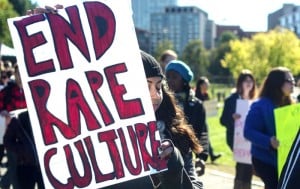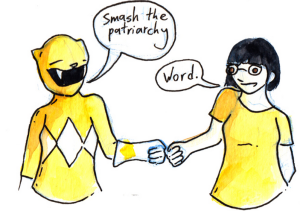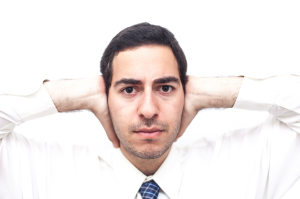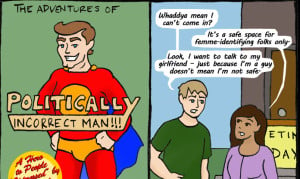The feminist movement is focused on inclusion now more than ever.
We know that fostering safer spaces and organizing with inclusivity in mind makes us stronger and more likely to succeed, and feminist activists are using the concepts of intersectionality to build a new feminist framework for changing the world that seeks to liberate all – not just some – of us.
And while the feminism I practice is one that is focused on justice for all people, and particularly for the most marginalized groups in our society, I’ve come to understand that simply being in diverse spaces is just as necessary for my own personal, intellectual, and creative development as it is for collective liberation and revolutionary movements.
Laws and regulations now stipulate that we work and share space with people who don’t look like us or come to the table with experiences like ours, but diversity isn’t just important or valuable out of principle.
Pushing for more diverse spaces isn’t something we should do “because we have to,” or even just because we know it’s “the right thing to do.”
Diversity is something we should strive for at work, at school, and in our community spaces because it’s good for us.
When we talk about “diversity,” we’re often referring to the simple act of sharing space with people unlike us.
As activists, we know that diversity is never nearly enough in and of itself, and that striving for full inclusion – in which we’re building and maintaining those spaces together with equitable power structures in place – is a more necessary goal.
But even that simple act of sharing space is powerful. It can change our lives and transform our experiences.
Studies have shown in recent past that businesses with more women and ethnic minorities on their teams and in their highest ranks go further and grow faster than their more homogeneous counterparts.
By simply meeting people unlike us, we become more empathetic to their challenges and more likely to support them in their fights for justice. Diversity sparks our creativity, pushes us toward innovation, and helps us think outside of our own boxes.
We know that building educational environments in which we’re challenged to broaden our perspectives and learn about experiences and identities unlike our own enriches our lives. Forming connections with people unlike us breeds empathy, but it also opens our minds.
Diversity is transformational.
And that’s why it matters – not just in feminist and social justice spaces and movements, but throughout our culture and in every aspect of our lives.
Diversity Makes Us Smarter and More Creative
Working with people who aren’t like us – or even being in workspaces, learning environments, or communities alongside them – sparks our own innovation and significantly shifts our social and cognitive behavior.
The result?
We become more innovative and imaginative – just by acknowledging each other’s differences and learning about each other’s experiences.
Diversity promotes creative thinking and increases our capacity to see problems from different perspectives and vantage points. According to Aaron Thompson, coauthor of Diversity and the College Experience, diversity is what could “liberate you from the tunnel vision of an ethnocentric and egocentric viewpoint.”
Thinking outside the box and straying from the norm is what makes us good entrepreneurs, innovators, and social beings – and we can’t do that from inside an echo chamber.
When we are challenged to see outside of ourselves – outside of our experiences, outside of our value systems, outside of our own socialization – we are free to truly express ourselves and craft innovative and creative ideas.
Diverse environments give us ample room to be challenged, broaden our perspectives, and change our hearts and minds – all of which fuel our ability to do our best work and be our best selves.
Interacting with people who are different than us also strengthens our own self-awareness. By learning more about different cultures, opinions, lifestyles, and points of view, we can begin to analyze our own.
Differences highlight our own understanding of the world, and where it might be flawed or based in misinformation.
It also allows us to think critically about our own views and values and empowers us to make truly rounded decisions based on experiences unlike our own.
Diversity, of course, doesn’t always mean someone will disagree with us.
Having people of different genders or ethnicities or sexualities in one space doesn’t guarantee that someone will take issue with your project plan, suggest a new solution to your problem, or shed light on your deeply personal beliefs.
But science suggests that when we look around a room and see diversity, we actually begin to do that work ourselves.
Simply being in a diverse space – even one in which we’re not being challenged by new or different ideas – makes us think as if there are new or different ideas on the horizon.
We anticipate different opinions and perspectives, and in doing that we actually begin to learn to challenge ourselves without first being challenged.
All of this leads to better outcomes, because it makes us truly evaluate our decisions and choices critically. It also pushes us to do better, and makes us more open to criticism when it comes.
Being with other people who are similar to us often leads us to assume that they come to our spaces with the same knowledge, experience, and perspective as us. That can make us less likely to put things up for discussion, express ourselves freely, or even dissent with people we disagree with.
Even the notion of diversity at “face value” shifts how we experience the world and the creative process.
Diversity Can Change the World
By broadening our perspectives and changing our hearts and minds, diversity actually can spur progress and change the world.
We know that diversity expands our minds and enriches our creative process. We know it sharpens our sense of self and helps us learn about different cultures, experiences, and value systems. But in that process, it also provides us with an important tool for breaking down social and cultural barriers to acceptance.
Diversity forces us to confront and challenge stereotypes and tropes, improves our ability to communicate along lines of difference, and fosters mutual respect among groups that may not have much in common.
Along the way, diverse environments enable us to better value people based on their character and contribution, rather than judging them based on their identities.
Diversity brings people different than us to life in our own lives, and it teaches us empathy, closes gaps in understanding between different groups of people, and makes breaking down those barriers everyone’s problem instead of just a marginalized group’s issue. By doing so, it makes it harder for us to hate one another.
In 2009, a Gallup poll showed that Americans who knew gay or lesbian people were more likely to support same-sex marriage and gay rights overall than their counterparts who knew no queer people. That was a paramount discovery for the movement for gay rights.
By simply saying “I am someone you know and I am gay,” queer people were spreading acceptance where once there lived only hate and animosity.
When we realize that people who are different from us are also members of a shared community or space that we belong to, they become humanized to us. We begin to develop empathy or even find ourselves allied to them and their issues, which leads to us being more embracing or affirming toward their difference overall.
Diversity helps us see our commonalities, and not our differences, across identities and groups.
A diverse learning environment is one in which children learn to see people from different racial backgrounds as more like them. A diverse workspace is one in which people of all genders are appreciated for what they bring to the table, instead of pigeonholed into doing tasks based on cultural myths.
A diverse community is one in which we work with our neighbors across difference to foster a safe environment for our families and friends.
By simply being around people who aren’t like us, we learn to put ourselves in their shoes and anticipate their opinions, reactions, and emotions – and we learn that those things matter.
This doesn’t mean that discrimination, bigotry, and prejudice don’t persist in diverse spaces, but it does show that truly embracing diversity and challenging ourselves to acknowledge and cherish difference can shift our culture.
Diversity Is Good for the Bottom Line
All of this is not to say, however, that the only tangible benefit to diversity is a more loving, empathetic, and healed world. (Although that’s pretty awesome, if I say so myself.) In fact, diversity is key to a more productive, competitive, and successful society – and it’s good for corporate bottom lines to know that.
Study after study has confirmed that diversity of different kinds – be it along the lines of race, gender, class, or even interest or skill – enriches work environments and makes us more successful entrepreneurs, employees, and captains of industry.
Corporations were 15% more likely and 35% more likely to have financial performance above the UK national industry median if they had gender and racial diversity in their ranks, respectively, according to a McKinsey study.
Research has found that companies focused on building diverse workforces have higher average returns on equity, lower debt ratios, better average growth, and better monetary outcomes. Investors are better off investing in companies with women on management boards; Wall Street traders tend to set more accurate prices in ethnically diverse groups.
It isn’t just the corporate world, however, that benefits from diversity in teams. Research completed by diverse teams is more high-quality, and academic papers by diverse groups have been found to be more impactful.
What diversity does for us as workers is set off an impetus to work harder and more diligently. We begin to see possibilities outside of “what has always been done” or what we and everyone like us thinks is the best idea.
Diversity is what makes it possible for us to continue working and developing ideas in a global, interconnected world.
Employers who keep diversity in mind during the hiring process will find themselves picking from an even larger pool of terrific applicants and qualified leaders.
Seeking out diversity in opinion and experience only makes our own work stronger – and the results are a more satisfied public, lower turnover, economic growth, and employees who work together and work harder.
The American Council on Education’s statement “On the Importance of Diversity in Higher Education” hits on all of these points.
From increasing America’s competitiveness in global markets to building a spirit of teamwork in corporations and organizations of all sizes, diverse learning environments and working environments sustain our society’s successes.
That’s why diversity matters – in community spaces, at work, at school, and in our personal lives. Surrounding ourselves with people who aren’t like us makes us better people, sharper thinkers, and more successful workers.
Diversity sparks our creativity, fuels innovation, and helps us form more balanced, grounded, and empathetic perspectives on our world.
Sound Good? It’s Only the Beginning
It’s pretty obvious that diversity has benefits. Sharing space with people we’re not like challenges and invigorates us. But it can also be difficult – especially for the most marginalized among us who often suffer in spaces that are unwelcoming or unsafe.
Diversity isn’t about just sharing space. It’s about sharing ownership of a space, both creatively and physically. And that means fostering environments where harassment, microaggressions, and cultures of homogeneity don’t prevent any of us from feeling creatively awake, socially comfortable, and open-minded.
Too often, the people benefitting from diversity are those in socially dominant groups, and the rest of us feel like we’re around for their entertainment.
The truth is that there’s nothing to lose and everything to gain from everyone feeling invigorated and excited instead of only most of us.
Building diverse spaces isn’t just about unlocking the excitement or inspiration of “different” or “exotic” people; it’s about how embracing and forming real, genuine connections across lines of difference makes us feel.
When we commit ourselves to diversity, we’re starting down the path to real and meaningful inclusion – and getting there isn’t optional. It’s important to foster, build, and demand spaces where everyone feels valued, respected, and safe.
What diversity alone lends us in the big scheme of things are tangible and powerful improvements to our lives, and those improvements are just a small glimpse at what a world where everyone is valued, respected, and honored would look like.
[do_widget id=”text-101″]
Carmen Rios is a Contributing Writer for Everyday Feminism. She splits her time disparately between feminist rabble-rousing, writing, public speaking, and flower-picking. A professional feminist by day and overemotional writer by night, Carmen is currently Communications Coordinator at the Feminist Majority Foundation and the Feminism and Community Editor at Autostraddle. You can follow her on Twitter @carmenriosss and Tumblr to learn more about her feelings.
Search our 3000+ articles!
Read our articles about:
Our online racial justice training
Used by hundreds of universities, non-profits, and businesses.
Click to learn more







